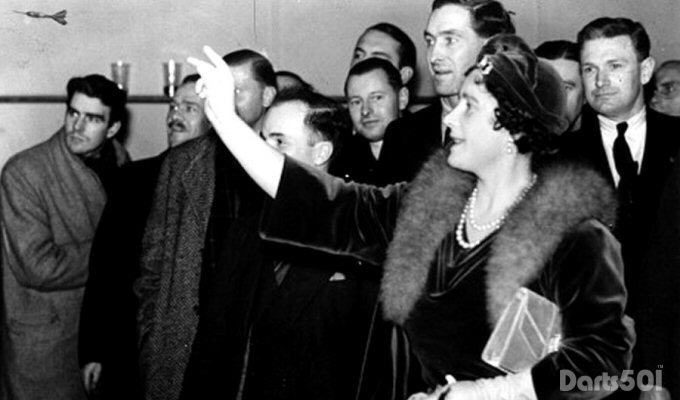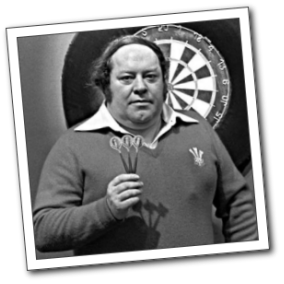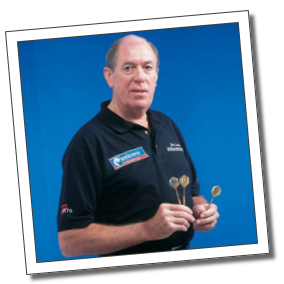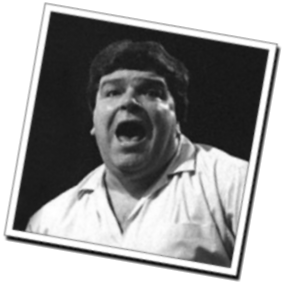History |
The sport or game of darts is unique in several ways: the equipment required to play is reasonably inexpensive, a relatively small amount of space is required to play, and special clothing is not required. Age, gender, size and physical strength or endurance have almost no effect on a player's ability to do well. These factors combine to make darts one of the appealing and popular games today.
(Picture early London pub darts 1937)
Although references are made darts first being used from the medieval time when Bowman would use a shorted arrow to use as a throwing arrow into a wooden target the modern game stems from France.
Darts, known in France as 'Fléchettes' (meaning 'small arrow') consisted of a short dart thrown into a target with concentric rings. The original darts were made from wood. They had a metal point, and the flights were made from bird feathers mainly turkey feathers.
In 1530 Anne Boleyn gave Henry VIII a set of "darts of Biscayan fashion, richly ornamented," these were not darts as we know them today but more of a small throwing spear. Even our Pilgrim fathers are said to have had darts on the Mayflower (1620), and although their primary use was for a weapon it is conservable they may have used the butt of a wine cask as a "board" for target practice. However, Queen Elizabeth, I throw the odd dart as seen here below.

(Queen Mum showing she can also throw a dart!)
The dart itself became more or less standardised as the practice of throwing "missiles" at targets became a general pastime -- the barrel was typically a piece of wood about 4 inches long with a metal point stuck in one end and feathers on the other. An American patented a folded-paper flight in 1898, and the all-metal barrel patented by an Englishman in 1906.
The number system on the board is often credited to Brian Gamlin, a carpenter from Bury, Lancashire, who is said to have invented it at the age of 44 in 1896 but he died in 1903 without patenting it. But after extensive research viewing the English and Wales Census and contacting Bury Newspapers and archives, no trace of Brian existence can be found. This is not to say he didn't exist, as some reports say that Brian was also attached to a travelling circus and may have missed the census at the time...
According to another source, Thomas William Buckle invented the dartboard in 1913. The source in question is his son, Thomas Edward Buckle, who 1992 made this statement in Darts World (issue 234).
Where does the word Oche come from?
'Oche' as a word meaning the throwing line which a dart player stands behind to throw his or her darts is comparatively recent, being introduced by the British Darts Organisation in the mid-1970s. The actual word is believed to be derived from Old Flemish (or similar) meaning a notch or nick but let the truth be known.
The truth is since the 1920s; the word was 'Hockey' and not 'Oche' was used in competition rules. It is believed a writer miss herd the name and recorded it as 'Oche'.
References to 'Hockey and Son' Brewery and the throwing distance being created by putting beer creates end to end has always been a nice theory, but it is untrue. No such Brewery every existed in the UK hence to say this myth has been around for years.
In 1908 a decision was made by the Magistrates in Leeds, England which effectively ensured the eventual popularity of darts as a sport. At that time, "games of chance" were illegal in public houses (pubs). A pub owner called "Foot" Annakin was accused of operating a game of chance and prosecuted for allowing darts at his establishment. Foot argued that darts was not a game of chance, and obtained permission for a board to be set up in the courtroom. It is said that Anakin threw three darts in the 20 and invited any magistrate to do the same. The challenge was accepted. However, the court officials were unable to duplicate Foot's shot, thus proving darts was indeed a game of skill and not of chance; the case was dismissed. The years afterwards saw the progression of the game in British public houses; by World War II the majority of pubs had dartboards, and teams and matches with other pubs were arranged regularly.
Further research by Dr Patrick Chaplin reveals that Annakin wasn't a publican at all he worked in a forge. Annakin was, in fact, the best darts and dominoes player in the Adelphi Inn. When the landlord of the Adelphi, Jim Garside, was summoned to Leeds Magistrates' Court to answer the charge of allowing a game of chance to be played on his premises, he asked Annakin to come along and demonstrate darts was a game of skill.
The first significant step towards making darts the international game it is today occurred when The News of the World, a British Sunday newspaper, instituted its championship in 1927. Initially confined to the London area, the event nevertheless drew large numbers of participants, and due to its success became a national competition after World War II. This event grew into one of the most prestigious and sought-after international titles in the sport but was suspended in 1990. It returned in 1997 but was restricted to players in the UK. (This event sadly is no longer being played)
Major credit for promotion of the game goes to The News of the World and also to the National Darts Association of Great Britain (NDA), formed in 1954, for their contributions in creating both an international forum for the sport and establishing basic acceptable rules of play.
The NDA drew together various Counties, London groupings and began holding English national competitions in 1957.
The British Darts Organisation (BDO) was formed in 1973 by Olly Croft. He helped to coordinate the strengths of the various County associations and the development of various County championships, with the organisation of international events following soon after. The BDO's primary focus at that time was acquiring sponsors and running special events for television. In 1978 the BDO organised the Embassy World Professional Championships, one of the biggest events in darts.
In 1976 the BDO was a significant force in setting up the World Darts Federation (WDF), which was formed by representatives from 15 Countries to govern and promote the sport of darts on an international basis. Among the first decisions of the WDF were the recommendation of a standard throwing distance for all countries, and the inauguration of the World Cup, an international event held every two years since 1977 in which top players compete for their respective countries. Today the WDF is comprised of the national darts organising body from each of 49 member countries, representing six continents.
The 1970s and 1980s witnessed the first darts 'stars' such as Eric Bristow, John Lowe, Alan Evans, Jocky Wilson, Leighton Rees, Cliff Lazarenko, to name just a few. All became household names during this period.




(Four World Champions left to right Leighton Ress, Eric Bristow MBE, John Lowe MBE & Jocky Wilson)
In 1992 saw a significant split between the BDO and several professional players. The game had lost some sponsors and had declined from the TV screens leaving the Embassy World Championship as the only televised event. The professionals felt that not enough was being done to encourage more sponsors into their sport, and TV courage should be bigger than one event a year. A group of professional, including Eric Bristow, John Lowe, Phil Taylor, Dennis Priestley and more formed a new darts organisation known as the World Darts Council (WDC). The following few years saw any member of this new organisation excluded from BDO events. A legal battle between WDC and the BDO was also on the way. This bitter dispute over the rights to darts organisation fell in favour of the WDC. But one of the words' World' had to be dropped. The organisation as we know it today is the Professional Darts Corporation (PDC) The PDC has now introduced some key, high profile competitions including the World Matchplay, Grand Prix, Premier League, and the PDC World Championship. The British Darts Organisation (BDO) continues to support youth and County darts. It organises major championships including the World Masters and the BDO World Championships (formerly the Embassy World Professional Darts Championship.)

From the mid-1990s through to 2017, one darter dominated the scene of darts, Phil' The Power' Taylor. In his career as a top darting professional, he won the world championship a total of sixteen times and the World Matchplay sixteen times. Phil raised the standards with higher darting averages and clinical finishes.
During this time darts promoter, and chairman of the PDC Barry Hearn, arranged head to head encounters with the then-current BDO World champion and PDC World Champion. At the time Phil was the undisputed best dart player on the planet and always won these encounters.
On The 24th March, 2005 Sport England took the lead in officially recognising darts as a sporting activity.
The decision was approved at a recent Sport England Main Board meeting and paved the way for further recognition from other sports councils in Scotland, Wales and Northern Ireland.
In taking the initiative to acknowledge darts as a legitimate sporting activity, Sport England took into account its status as a national and international sport, its high and growing levels of participation and the physical and mental skills and dexterity needed to compete successfully.
Sport England Chief Executive, Roger Draper, said that the Board decision looked beyond the stereotypical image of darts and took into account its many positive sporting and social values: "The presentation of darts as a pub game has helped popularise its cult appeal, but the reality is that it is a sport played by many thousands of people across the county in locations ranging from schools to village halls, social clubs and sports centres".
"By taking the lead in recognising the skills and social and community values associated with darts, we hope others will follow suit in the near future to complete its formal and official recognition as a sport," he added.
Full sporting recognition will allow darts authorities to take advantage of tax incentives afforded to recognised sports by the Government. There are currently no plans for Sport England to fund darts, as in February this year (2005) the four-year funding strategy was confirmed for the national governing bodies of sport.
Initially recognised by Sport England, on the 3rd June 2005 Sport Wales, Sport Northern Ireland and Sport Scotland have now added their unanimous agreement that darts became a recognised as a sport.
Returns to Darts Resource
More at Darts501.com